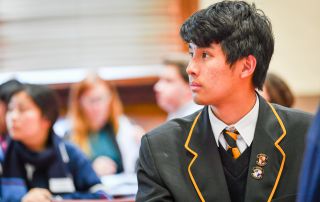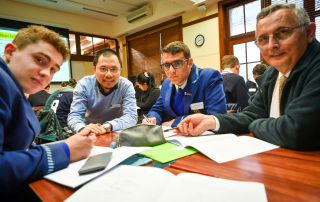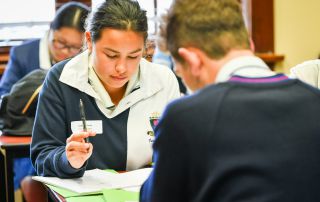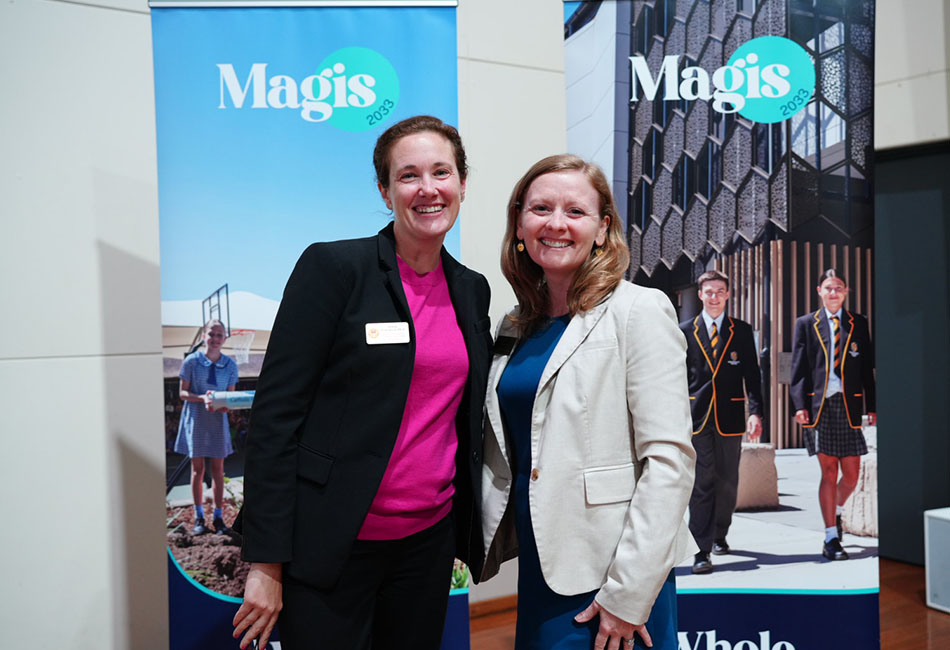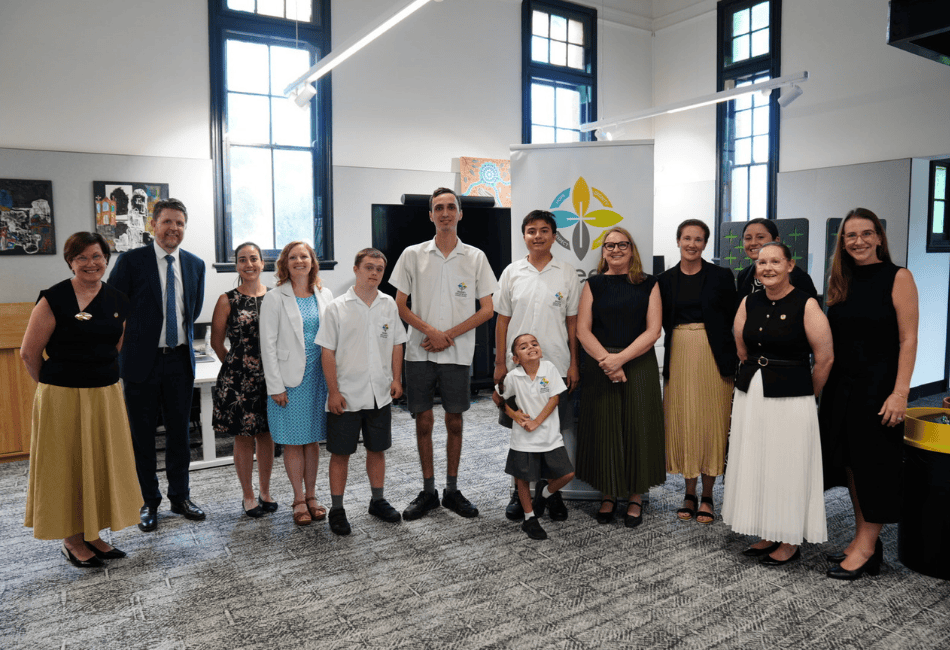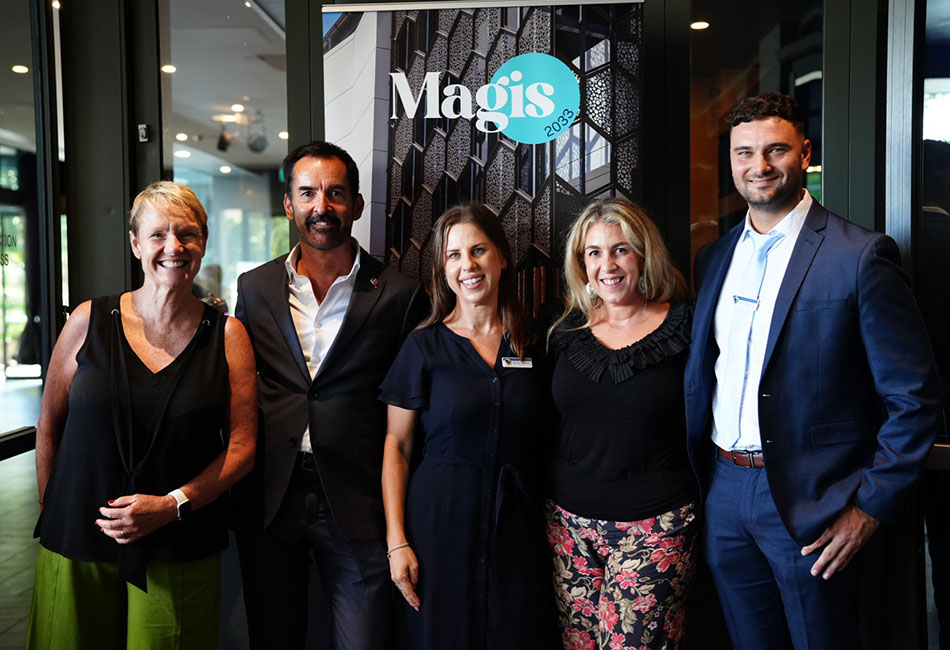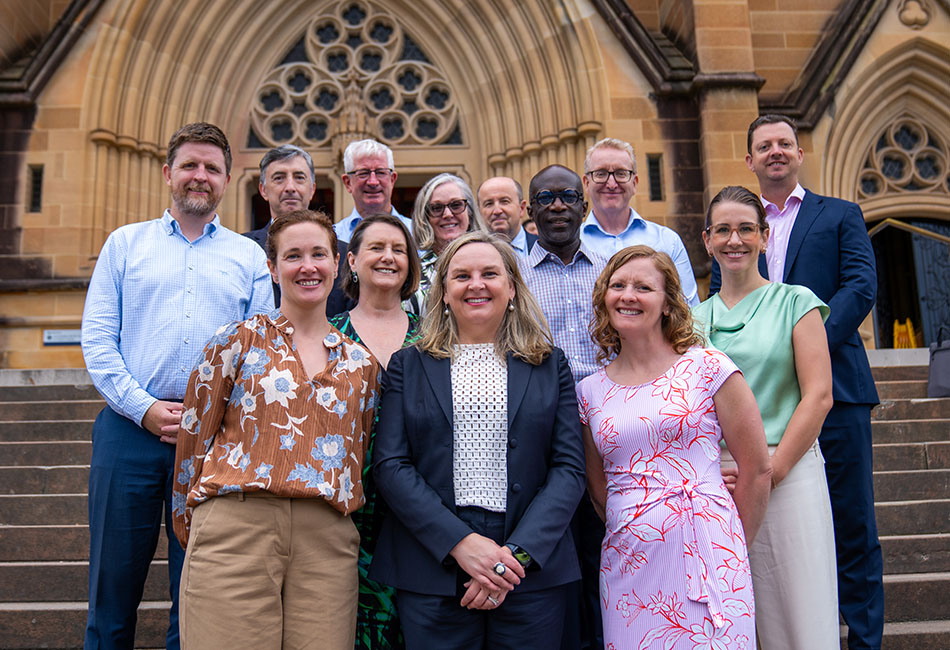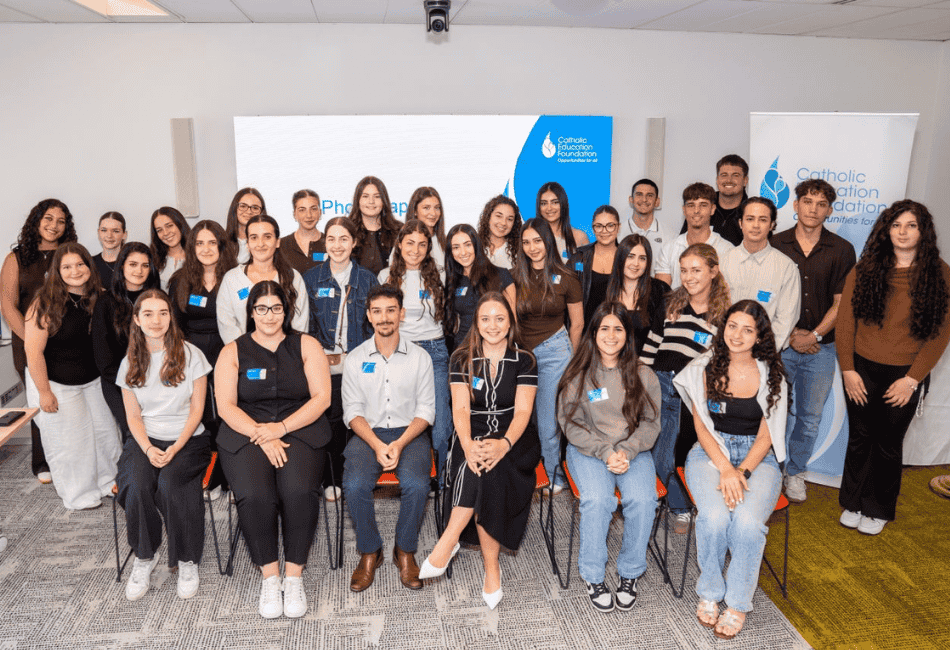Studying the highest levels of HSC mathematics can be daunting, especially if you’re the only one in the class.
Sydney Catholic Schools (SCS) has launched a new online forum to support those who take on the challenging subject at a specialist-led event hosted by The University of Notre Dame, where Mathematics Extension 2 students from 27 Sydney Catholic high schools got a 360-degree view of the career possibilities high-level mathematics creates.
Held at the University’s Broadway campus on 29 August, the event allowed the 89 students to hear from experts on four of the most challenging topics in the course – Inequalities, Induction, Mechanics and Circle Geometry. A panel discussion at the end of the day gave students insight from past Extension 2 students on how the subject related to careers in fields including engineering and medicine.
Mathematics teacher at Freeman Catholic College Bonnyrigg Heights Carla Giuliani-Bruno led a session on Circle Geometry, while academics Peter Brown and Alan McCarthy and educator Morris Needleman also drew on their extensive mathematical and teaching experience to unpack other topics for the students.
Future focus
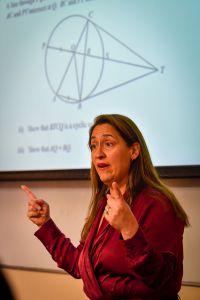 SCS Education Officer: Mathematics and Numeracy K-12, Dr Christine Mae, and her colleagues Jan Harte and Angela D’Angelo, hope that increased support and resources will highlight the importance of Mathematics and the career options it opens for students.
SCS Education Officer: Mathematics and Numeracy K-12, Dr Christine Mae, and her colleagues Jan Harte and Angela D’Angelo, hope that increased support and resources will highlight the importance of Mathematics and the career options it opens for students.
The event and new online forum are part of a six-year goal to encourage more students to take the highest levels of HSC Mathematics. The online forum comes less than six months before the course’s new syllabus is introduced in 2020, and will address challenges associated with the course. These include the demanding workload it presents for students and teachers, and the fact it is almost always run before or after regular school hours.
“Mathematics Extension 2 is one of the most rigorous, challenging and rewarding HSC subjects and opens up worlds of opportunity for students in life beyond schooling,” Dr Mae said. “Higher levels of mathematical expertise also provide highly developed reasoning skills that are flexible and adaptable in responding to problems and challenges, including those related to the sustainability of our nation and our planet.
“The online platform reflects the belief that working together everyone achieves more. It provides the opportunity for students to collaborate and pose, share and respond to questions, problems, solutions and proofs. Feedback on this resource will be used to inform and adapt the design to maximise support for students in 2020.”
The forum continues SCS’ focus on improving mathematical achievement at all stages of the learning journey, beginning with the Mathematical Expertise and Excellence project the organisation launched in 2018 to give students the opportunities to practise and master mathematical concepts through cognitively challenging tasks from the beginning of Kindergarten.
Mathematics Extension 2 is one of the most rigorous, challenging and rewarding HSC subjects and opens up worlds of opportunity for students
“It is a strategy that plays a vital role in increasing the number of students studying and aspiring to study higher levels of mathematics in the future,” Dr Mae said.
“The University of Notre Dame’s generosity in hosting the day for students also provides a wonderful opportunity for them to hear from academic staff as well as students who are already engaging in career pathways that draw upon higher levels of mathematics.”
UNDA Dean of Arts and Sciences, Professor Cate Thill, said the university was pleased to support the event for its emphasis on critical thinking, collaboration and the way it encouraged students to aspire to higher levels of mathematics.
“Notre Dame has an absolute commitment to critical thinking across all of its disciplines from philosophy right through to mathematics and medicine,” Professor Thill said.
“One of the important elements of today is to encourage students to tackle challenging questions in Mathematics, to really think deeply, and to do that in a forum that is collaborative.
“Often because of the competitiveness of the HSC people become very isolated, so I think today is so important to bring students together and build that sense of community that can then be sustained and supported with the launch of the online platform.
“The third element is the aspirational element, to lift their sights to where mathematics can take them. I’m a sociologist. We use Maths to advocate for change, improve policies and try to make a difference in the world. There is a huge spectrum of applications for Maths that you don’t usually think of when you’re in Year 11 or 12.”
Joshua Chew swapped engineering for medical science and was on the panel that spoke to students about how Maths relates to multiple career fields. “I think it’s important for students to understand that there are broader applications outside the classroom than pure Maths,” he said. “You can really apply it to different things to hopefully help people.”
Student view
Champagnat Catholic College Year 12 student Christian Lay is the only student at his school studying Extension 2 Mathematics this year. Though he has the support of a skilled Mathematics teacher, he said an online forum would be useful.
“We have a group chat for Extension 1 and 2 unit and there will be a number of times where we throw in a question and people pitch in with a solution or to reinforce the part we don’t understand,” he said. “I think we need more of that for Extension 2 since some people don’t have a teacher and some have to wait until they have a period where they can talk to the teacher. It’s nice to have that contact on the go.
“Sometimes I’ll work out a solution and get the right answer but still think ‘Is this right’? There’s always more than one way to do things. My teacher will show me the long or ‘proper’ way to solve something first. It’s interesting to see that some solutions take shortcuts in the logical steps but they are still valid.”
Megan Nguyen is one of 10 Mount St Joseph Milperra Year 12 students who study mathematics Extension 2. Megan, who plans to become an engineer, was inspired to take on the challenge by her sister and cousin who had done the course in 2013 and 2017.
Knowing that this can be applied in the future to real-world situations gives it more relevance
“The subject is mentally straining so it’s nice to have people you know helping you through,” she said. “The day has been really good, especially because all of the lecturers have been very clear in explaining things and very welcoming.
“In the HSC period when we’ve already graduated there’s not as much opportunity to contact our teachers and they may be under their own workload, so talking online to like-minded people and teaching them your knowledge, and the reverse, getting more knowledge from them, is helpful. Knowing that this can be applied in the future to real-world situations gives it more relevance and makes it more interesting to learn.”
Former Patrician Brothers’ College Fairfield student and Acting Assistant Dean at UNDA’s School of Education Dr Thuan Thai helmed a mentoring space, where students could visit throughout the day to ask questions about the coursework and practice exam questions.
The cardiovascular researcher’s own high school Maths teacher, Br Dominic Xuereb, was at the event along with seven current Pat’s students.
“The examples they asked me about were the more challenging, integrated questions where they don’t conform to a single topic,” he said. “They are very different to the early parts of the paper where it is practice and memory – you plug in the numbers and there’s an answer. The later questions take a lot more thinking and there is a lot more emphasis on depth.
Dr Thai said Mathematics was useful to learn because it gave transferable skills.
“If you learn a formula there is only a very finite use for that, whereas if you look at Maths as a skill for analysis and thinking more broadly, that skill is going to be useful in every area of life,” he said.


